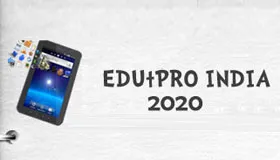EDUtPRO 2012 Summit: Tech Transformation in Education

Over 300 educators and digital practitioners got together in Hyderabad recently for the EDUtPRO 2012 summit, themed “Using Breakthrough Technologies to Transform Education.”
A number of provocative questions were discussed and debated. What kinds of skills and knowledge are technology solutions best suited to teach? Can educators leverage ICTs to make students even more employable in the global workforce? Are Indian teachers willing and able to learn from students about how to use digital media? What technology solutions work best for rural and less-funded schools? How do the roles of teachers and principals get transformed in the 21st century? What new opportunities arise for startups and entrepreneurs in this space?
“The computer is a tool, but the teacher is the magic. Both have a role to play,” explained Harish Chaudhry, management professor from IIT Delhi. He cautioned that ICTs may not be best suited to develop attentive listening, discussing, and debating skills. “There is no evidence to show that schools with significant ICT investments have shown better results or produced better human beings,” he added.
ICTs can however help visualisation, show trend analysis, expand a school’s resources, and reduce teachers’ wastage of time in basic activities such as drawing diagrams. ICTs can produce more informed teachers, parents, and principals, and also track student progress across years, subjects, concepts and even teachers, Chaudhry said.
Shefali Jhaveri, a teacher from the Canadian International School, Bangalore, showed how composition and writing skills can be improved via tablet usage in language classes, thanks to resources and apps such as iTunesU, iBooks, Qwiki, EdModo and Scribble Press.
I described how learners can start off with basic steps in social media, and progress all the way to sophisticated usage of online research and collaboration. Steps include initial tagging and mashups, followed by affinity networking and creation of multimedia content.
Digital media in schools can help students in collaborative activities, peer-rating/ranking, and asking questions (not just answering them!). Digital metrics in education range from basic activity (eg. number of blogs) to skill impacts (eg. better research and composition skills), and can even help educational institutes offer these educational services to a broader online audience around the world. However, children should also learn the importance of trust, safety, ethics, relevance and focus in cyberspace.
I showed how a range of startups in India are addressing educational transformation, eg. via gamification, cloud solutions, interactive e-books, test preparation and integration of classroom material with real-world real-time case studies.
For example, startups identified by YourStory.in through its EduSparks report and annual event include BrainNook, DreamNotion, MangoReader, OliveBoard, RedBytes and SharpEdge. Other winners in digital education identified by the annual awards of Manthan and mBillionth include: ILFS/Sparsh, Kisan Sanchar, BBC Janala, NIOS Online, CLT e-Patshala and M-Pustak.
“Children are living in times of unprecedented exponential change. And we accuse them of getting bored in schools,” joked Udai Lauria, President, Consortium for Research in School Pedagogy (CRISP).
“The 21st century teacher has to be a collaborator, risk taker, thought leader and networker. The 21st century calls for critical thinking, communication, collaboration, and creativity,” said Lauria. He cited the UNESCO ICT Competency Framework for Teachers as a good resource for educators in tech space.
“Teachers are expected to create super-kids these days,” joked Arundhati Ghosh, Deputy Director, India Foundation for Arts (IFA), Bangalore. ICTs can be used to enhance arts: music, theatre, film, and heritage, according to Ghosh.
IFA works with government school teachers in Karnataka and students of IIM Bangalore in leveraging art and creativity in problem solving. “Art education can help you integrate the personal and professional,” Ghosh emphasised.
“The more ways you teach, the more children you reach,” succinctly summed up Anjum Babakhan, Director of Education, Glendale Academy.
She cited Howard Gardner’s theories of multiple intelligences, and showed how each leads to different types of professions, and how each can be enhanced in different ways by ICTs.
“India still has an ‘industrial age hangover’ in education, it uses the assembly line metaphor for education -- one size fits all,” Babakhan observed. “Adults in the digital age need even more education and skilling than youth,” she added.
“Use ICTs to create more pathways to learning. India will have the largest proportion of young people in the world, and we have to address their creativity in every way possible,” she concluded.
[Follow YourStory's research director Madanmohan Rao on Twitter]






